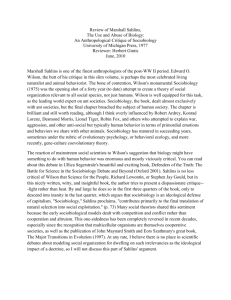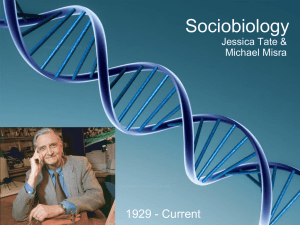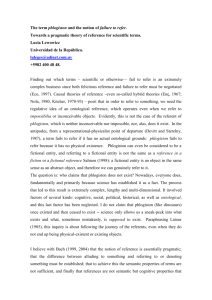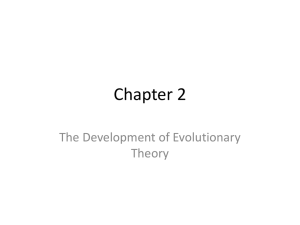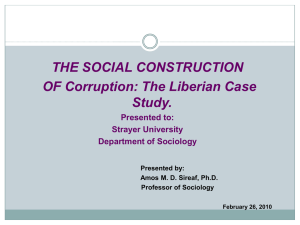Sociobiology and the Quest for Human Nature
advertisement
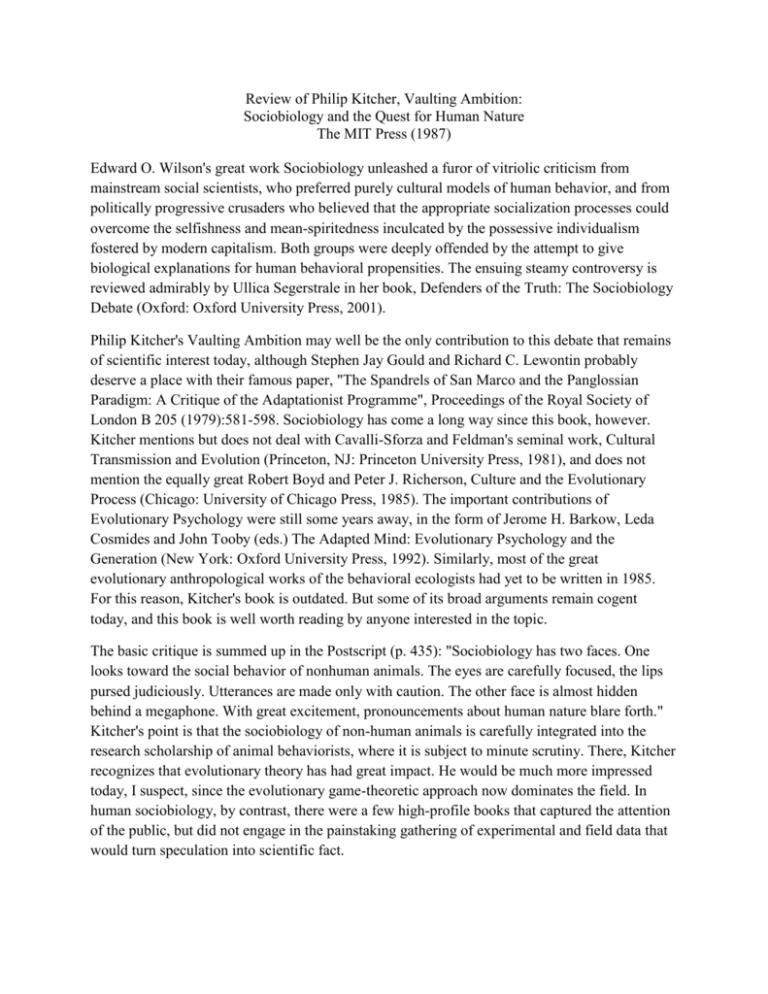
Review of Philip Kitcher, Vaulting Ambition: Sociobiology and the Quest for Human Nature The MIT Press (1987) Edward O. Wilson's great work Sociobiology unleashed a furor of vitriolic criticism from mainstream social scientists, who preferred purely cultural models of human behavior, and from politically progressive crusaders who believed that the appropriate socialization processes could overcome the selfishness and mean-spiritedness inculcated by the possessive individualism fostered by modern capitalism. Both groups were deeply offended by the attempt to give biological explanations for human behavioral propensities. The ensuing steamy controversy is reviewed admirably by Ullica Segerstrale in her book, Defenders of the Truth: The Sociobiology Debate (Oxford: Oxford University Press, 2001). Philip Kitcher's Vaulting Ambition may well be the only contribution to this debate that remains of scientific interest today, although Stephen Jay Gould and Richard C. Lewontin probably deserve a place with their famous paper, "The Spandrels of San Marco and the Panglossian Paradigm: A Critique of the Adaptationist Programme", Proceedings of the Royal Society of London B 205 (1979):581-598. Sociobiology has come a long way since this book, however. Kitcher mentions but does not deal with Cavalli-Sforza and Feldman's seminal work, Cultural Transmission and Evolution (Princeton, NJ: Princeton University Press, 1981), and does not mention the equally great Robert Boyd and Peter J. Richerson, Culture and the Evolutionary Process (Chicago: University of Chicago Press, 1985). The important contributions of Evolutionary Psychology were still some years away, in the form of Jerome H. Barkow, Leda Cosmides and John Tooby (eds.) The Adapted Mind: Evolutionary Psychology and the Generation (New York: Oxford University Press, 1992). Similarly, most of the great evolutionary anthropological works of the behavioral ecologists had yet to be written in 1985. For this reason, Kitcher's book is outdated. But some of its broad arguments remain cogent today, and this book is well worth reading by anyone interested in the topic. The basic critique is summed up in the Postscript (p. 435): "Sociobiology has two faces. One looks toward the social behavior of nonhuman animals. The eyes are carefully focused, the lips pursed judiciously. Utterances are made only with caution. The other face is almost hidden behind a megaphone. With great excitement, pronouncements about human nature blare forth." Kitcher's point is that the sociobiology of non-human animals is carefully integrated into the research scholarship of animal behaviorists, where it is subject to minute scrutiny. There, Kitcher recognizes that evolutionary theory has had great impact. He would be much more impressed today, I suspect, since the evolutionary game-theoretic approach now dominates the field. In human sociobiology, by contrast, there were a few high-profile books that captured the attention of the public, but did not engage in the painstaking gathering of experimental and field data that would turn speculation into scientific fact. The scientific basis for sociobiology is immeasurably advanced over its state two decades ago. While the great public debate was in progress, researchers like Cavalli-Sforza and Feldman, Boyd and Richerson, Cosmides and Tooby, Daly and Wilson, Boehm, Hawkes, Kaplan, Wiessner and many others have established the biological foundations of human behavior as a fruitful field of study. Nevertheless, debates based on highly speculative assertions rage in the popular science press, fueled by the considerable expository skills of Robert Wright, Stephen Pinker, Mat Ridley, and others. Moreover, modern-day sociobiologists, who are more likely to call themselves "evolutionary biologists," continue to exhibit two traits which are major subjects of attack by Kitcher. The first is to see every human characteristic as a biological adaptation with a genetic basis, and the second is to consider biological adaptations as aspects of human nature that are basically immutable through cultural intervention. Neither of these is reasonable. On the first count, human characteristics are the product of gene-culture coevolution, not genes alone, and the cultural elements are often dominant. For instance, in human society, increased longevity and wealth has led to a decrease in family size (the so-called "demographic revolution"), which is directly fitness-reducing by definition. Our species is, indeed, the only known species to which the Malthusian population mechanism does not apply in full force. To call this behavior a biological adaptation is absurd. On the second count, while sociobiologists are doubtless correct in asserting that there are genetic differences between men and women that lead to consistent behavioral differences, it is likely that egalitarian institutions and gender-neutral cultural norms can promote a high degree of gender equality in modern societies. Kitcher's critique of E. O. Wilson (p. 181ff) on this count is very telling. Kitcher notes that sociobiologists have pointed to the failure of the Israeli kibbutzim as an example of the immutability of the sexual division of labor. He suggests, quite rightly, that there are many alternatives to the kibbutz besides the patriarchal family. And so there are! There is also one extremely important difference between the politics of sociobiology today and yesteryear. Kitcher takes it as axiomatic that sociobiology is profoundly conservative, racist, sexist, and intolerant of diverse life-styles (e.g., homosexuality). I have my doubts about this characterization of the sociobiologists of the period, but there can be no question but that this is how they were perceived by the public and their intellectual enemies. This is no longer the case. While dyed-in-the-wool Marxists still rant about the conservatism of contemporary sociobiology, by and large its proponents have shed this image and are widely appreciated for creative insights in promoting racial and gender equality, tolerance of diversity, and opposition to senseless violence. Kitcher asserts there is no general sociobiological theory (p. 118), so there is no overarching critique of sociobiology, but only piecemeal critique of each of its many assertions. This critique was doubtless correct, although I now think that gene-culture coevolutionary theory is an encompassing framework for contemporary sociobiology (others believe that Evolutionary Psychology holds this position). The later chapters of the book are less successful. Kitcher's critique of Lumsden and Wilson, Genes, Mind, and Culture: The Coevolutionary Process (Cambridge, MA: Harvard University Press, 1981) is correct, but his time would have been better spent dealing with a better book; e.g., the Cavalli-Sforza and Feldman book published in the same year. Kitcher's critique of the "Panglossian" tendency of sociobiology is mostly wrong, and certainly out of date. Of course, the idea that natural selection leads to optima is generally fallacious, but this has little to do with sociobiology. Finally, Kitcher's defense of traditional philosophical approaches to ethics (altruism, free will, morality), is interesting and spirited, but I think it is just wrong. Philosophers would do well, I believe, to take an evolutionary approach to ethics, rather than the Platonic, axiomatic approach that they tend to take.
